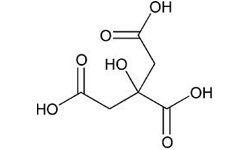Citric Acid Anhydrous
Description:
The application of citric acid is commonly found in packaged foods and drinks, where it is added to canned and jarred foods to keep them fresh for long periods of time. The outbreak of the COVID-19 pandemic led to a supply-demand mismatch, and consumers across the world kept stocking up their food supplies in order to preserve them. The use of citric acid played a crucial role. Hence, the demand for citric acid throughout the pandemic had been strong.
The broad applicability of citric acid as an acidulant, preservative, antioxidant, buffering, and binding agent in the food and non-food industries is expected to result in its increasing growth over the forecast period. Citric acid is used throughout the dairy industry, in particular, within cheese production and processing. The acid helps create the perfect environment for the stabilization of emulsions, and it prevents fats from separating. It can also be used to adjust the pH of both beer and wine solutions during manufacture.

Properties of Potassium Citrate:
- White crystalline powder
- Practically odorless
- Strongly acidic
- Very soluble in water
- Freely soluble in ethanol
- Anhydrous
- Non-toxic
- Chemically and Biologically stable
- Low reactive
Applications:
- Acidulant
- Anticoagulant
- Chelating agent
- Buffering agent
- Acidifying agent
- Dairy
- Bakery
- Confectionery
- Snacks
- Flavours
- Meat, Seafood
- Packed ready to eat food
- Dressings, sauces
- Carbonated drinks
- Concentration syrups
- Instant mix drinks, energy drinks
- Packaged Juices
- Bottled water
- Alcoholic beverages
- Cosmetics
- Hair
- Skin
- Oral
- Toiletries
- Adhesives
- Pesticides
- Inks, Paints, Coatings
- Metal Surface Treatment
- Plastic, Polymers
- Paints, Coatings
- Industrial cleaner, dish washing
- Pharmaceutical Products
- Supplements
- Nutrition

